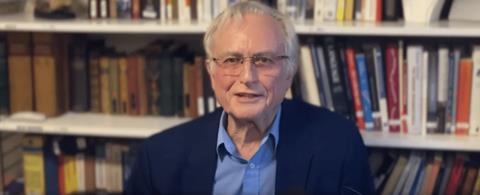Premier Christianity uses cookies Read our cookie policy.
By  John Heathershaw2024-04-02T11:53:00+01:00
John Heathershaw2024-04-02T11:53:00+01:00
Prominent atheists are declaring themselves “cultural Christians”. But you can’t pick and mix the bits of faith you like, says John Heathershaw. It won’t work

Source: LBC
Richard Dawkins, the famous atheist and author of The God Delusion (Black Swan), courted controversy on Easter Sunday by declaring his fondness for Christianity, “a decent religion in the way that Islam is not.” Dawkins went on to describe himself as a cultural Christian, noting: “I like to live in a culturally Christian country, even if I don’t believe a single word of Christian faith.”
There is nothing unusual about Dawkins’ stance. Conservative thinker Douglas Murray has described himself as a “Christian atheist”. On the left, Alastair Campbell – who once remarked that New Labour “doesn’t do God” – now counts himself a “pro-faith atheist”. The current Labour leader, Keir Starmer, is a self-declared atheist but has stated that faith groups “play a unique and vital role in the running of our country”.
So why do these prominent atheists like faith? To answer this question, we must consider the long shadow cast over Western countries by the demise of Christendom; the idea of an intimacy between Church and State which shaped our politics, economy and culture until the middle of the 20th century.
The Christian gospel will never be contained by national borders
Given this period was one of restricted individual rights – and occasionally the Church-sanctioned persecution of scientists, atheists and those of other faiths – it is odd that Dawkins and his fellow Christian atheists are so attracted to its cultural legacies, festivals and buildings. There are perhaps two reasons which explain their fondness.
First, we are now in a post-Christendom period. This has resulted in religious occasions such as Christmas and Easter being largely vacated of their Christian content. These moments in time – along with some of our church buildings – have become beautiful artefacts which create nostalgia for an imagined past.
A secular nation, lacking faith in anything other than its own experience and reason, is happy to selectively engage with these artefacts on its own terms. As a result, it is easier for atheists to give credit to Christianity for human rights and democracy, nice Bible stories and beautiful buildings – while leaving certain (vital) things out.
This is nothing new. The eminent Catholic philosopher Charles Taylor has long been wary of the secular “subtraction story” – that you can have the best bits of Christian culture with the meaning taken out. Dr Rowan Williams, former Archbishop of Canterbury, has previously accused politicians of viewing the Church as “a pool of cheap labour for projects of social integration”.
The second reason why Dawkins may have a new fondness for faith is less well understood and rather more serious. History suggests there are few – if any polities – that are held together without a faith claim. Some of the most famous secular states – the United States, France, China and the Soviet Union – have had to concoct civil religions of national creeds and prophets to sustain themselves. Think of American and French exceptionalisms, Maoism and Leninism.
There is good reason to believe that the secular impartiality towards religion will not hold us together in a world of disruptive economies, multiple cultures and shifting national identities.
All this creates a sense of insecurity and, in the UK, an inescapable feeling of decline. Many secretly (or openly) fear the rise of Islam and the intrusion of other cultures. The truth is that we do lack a meaningful basis for shared identity beyond the banalities of “Great British” patriotism, sporting events, and perhaps still the Royal Family.
Without the Christian just war tradition, we lack a basis on which to decide whether warfare is right. We are apparently bereft of an ethic of provision and left at the mercy of the morality of the market. No wonder atheists thirst for an imagined Christian country of the past.
Many Christians, though vaguely aware of the contradictions of Christian atheism, may happily reach out to Dawkins as an unlikely ally against the threats of secularism, multiculturalism and Islam. They may even want to team up with the likes of Lee Anderson MP, who recently defected from the Conservatives to Reform UK, to “get our country back”. But they would be unwise to do so.
Christian thinkers have long been wary of the secular ‘subtraction story’
The idea of a Christian country has never been consistent with the Christian gospel – which will never be contained by national borders. The intimacy between Church and State corrupted the Church – and implicated it in state violence, persecution and empire. As an identity, ‘Christian’ is properly global, not national. It is an unstable basis for any nation – which is surely why Christendom rightly declined.
Rather than lament the decline of the idea of a Christian country, Christians should respond with the hopeful idea of society centered on the Church – and reaching out to secular institutions and other faiths with the witness of Jesus Christ.
The post-Christian period is an opportunity to shed ourselves of the political baggage of Christendom and practice the local and multinational politics of the global Church. Our security is not found in our national culture, as this is passing away, but in the eternal culture of Christ.

Don’t Miss Out!
Limited offer: subscribe today and get free gift of Patrick Regan’s new book Brighter Days!
Delve into our thought-provoking content throughout this reflective season. Begin your enriching journey with us today.
Tell me more!
*offers available in multiple currencies, please enter your location on the subscription page
2024-04-12T08:34:00Z By Tony Wilson
Opening a Moscow youth centre, Russian president, Vladimir Putin, has compared himself to Jesus. It’s the latest in a long line of populist leaders using religious rhetoric for political gain, says Tony Wilson
2024-01-18T11:47:00Z By Andy Bannister
The most famous atheist in the world has stated “there are no good arguments” for God’s existence, yet continues to run away from debating a philosopher who appears to have plenty, says Andy Bannister
2023-11-17T08:19:00Z By Andy Bannister
Ayaan Hirsi Ali’s astonishing announcement that she has become a Christian, is almost as surprising as if Richard Dawkins had entered the priesthood, says Andy Bannister
2024-04-25T12:03:00Z By Sharmila Meadows
When you work in Westminster, you get used to the high drama of parliamentary debate. But this should never be confused with petty name-calling and rudeness, says Sharmila Meadows. It may be culturally acceptable, but it isn’t to God
2024-04-23T06:08:00Z By Chip Kendall
Too many Christians are misunderstanding what’s taking place between Israel and Hamas, says Chip Kendall
2024-04-22T14:05:00Z By Tony Wilson
The Prime Minister has vowed to tackle what he calls, “Britain’s sick note culture”. In responding, Tony Wilson says Christians are called to be compassionate to those who are sick, but argues the Bible also encourages us to work hard and be wise in not facilitating over-dependence
Site powered by Webvision Cloud
source

















Post comments (0)